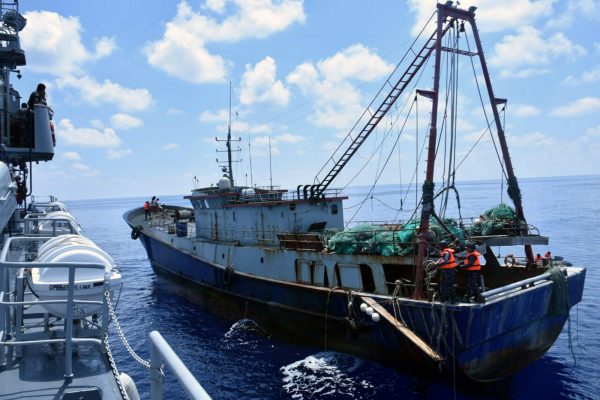These incidents show the need for an inquiry into the policies of China and Indonesia regarding the protection of seafarers’ rights. An Indonesian crewman revealed that seafarers work 18-hour days with only short breaks every six hours and that Indonesian workers were given filtered seawater while the Chinese workers had mineral water. Some workers were only paid US$120 in total after working for 13 months. The monthly minimum wage stipulated by the 2006 Marine Labour Convention (MLC) — that China ratified in 2015 — is US$625. This inhumane treatment by the Chinese staff violates human rights.
Article IV of the MLC stipulates that seafarers have the right to a safe and secure workplace, including fair terms of employment, decent working conditions and rights to health and social protection. But aboard Long Xin 629, the MLC was violated regarding overtime compensation (regulation 2.2), working hours (regulation 2.3) and rights to food and water (regulation 3.2).
These violations also contravene the International Labour Organization’s Seafarer’s Service Regulations adopted in 1984. According to Article 30, if a seaman on a voyage dies, the master shall immediately report it to the employer to deliver the bad news to the victim’s family. But with the recent incidents, the victims’ families were unaware of the deaths until the burial video was picked up by media outlets.
Media reports show that the operators of the Long Xin 629 have failed in their responsibility to ensure the rights of Indonesian seafarers. Action is needed to prevent further deaths.
But in some ways, China is beginning to promote the rights of seafarers. The Chinese government held the International Maritime Organisation (IMO) Regional Training Course in Shanghai in 2017. The training improved the knowledge and skills of seafarers and monitored the training and assessment of seafarer’s competence. The Chinese government also promulgated the Regulation of Seafarers of the People’s Republic of China (ROS) in 2007. This regulation is the first Chinese law to specifically address the rights of seafarers.
Policies for the protection of migrant workers, particularly seafarers, are comparatively more widespread in Indonesia. In 2012, Indonesia ratified the International Convention on the Protection of the Rights of All Migrant Workers and Members of Their Families (1990) and in 2017 it passed the Law on the Protection of the Migrant Workers. These legal changes cemented Indonesia’s pledge to protect its migrant workers, particularly seafarers.
More specifically on the rights of seafarers, in 2015, the Ministry of Maritime Affairs and Fisheries enacted the Ministerial Regulation No. 35/PERMEN-KP/2015 on System and Certification of Human Rights in the Fishing Industry. The Indonesian government also injected Rp 853 billion (US$60.4 million) to certify and standardise Indonesian seafarers’ knowledge of the 1995 International Convention on Standard of Training, Certification and Watchkeeper for Fishing Vessel Personnel. The Indonesian government also supports Rumah Indonesia’s operations to provide rooms at foreign port and to help gather data from Indonesian seafarers for protection procedures and is developing a tech-based protection app, Safe Travel.
The Indonesian and Chinese Foreign Ministers met more than three times in 2019, but they did not discuss actions for the protection of seafarers’ rights. Many Chinese vessels employ Indonesian seafarers. A Greenpeace report shows that from 2017–2019 the foreign fishing vessels responsible for mistreatment and exploitation complaints of Indonesian seafarers were from China, Taiwan and Fiji.
As the accident occurred on a Chinese fishing vessel, it is under Chinese jurisdiction, unless the ship is docked in a non-Chinese port. The Chinese government can address the inhumane treatment onboard Long Xin 629 using its national laws and measures. The Indonesian government is applying diplomatic pressure for this to occur, having summoned the Chinese ambassador and demanding further probing into the issue.
China and Indonesia should utilise their existing cooperation to support the resolution of maritime issues, including the protection of seafarers’ rights. They should also enhance cooperation and coordination in law enforcement and share intelligence regarding seafarers’ mistreatment onboard fishing vessels, as well as other unlawful transnational crimes. Training programs between China and Indonesia should equip maritime officials, the police, port authorities and other relevant officials to prevent human rights violations.
Tragedies such as those aboard the Long Xin 629 do not have to be repeated. China and Indonesia should cooperate to ensure human rights are respected aboard fishing vessels.
Anisha Maulida is a research intern at the Centre for Strategic and International Studies (CSIS) Indonesia.
Bayu Arif Ramadhan is a recent graduate of International Relations at Brawijaya University.

